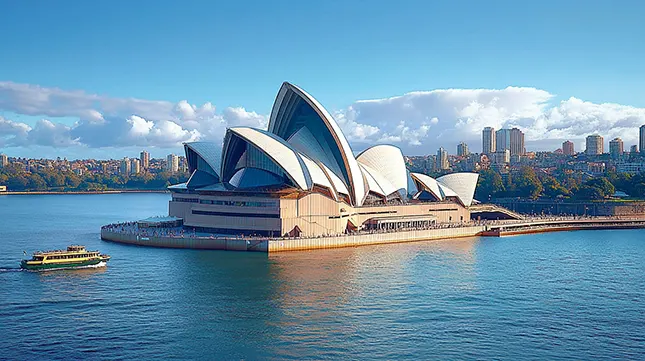Cost of Living in Australia vs UK

Moving to Australia offers many opportunities and a quality of life that many people can only dream about.
With its stunning landscapes, vibrant cities, and laid-back lifestyle, moving to Australia is a top choice for expats, especially those from the UK.
While the cost of living is often a concern for anyone considering relocation, Australia stands out for its unique balance between lifestyle and expenses – you may even have some preconceived ideas of what the cost of living here us like.
Australia offers a range of perks for families and professionals, from excellent healthcare and education to thriving job markets in key industries.
Compared to the UK, where rising living costs have become a growing concern, Australia may present a refreshing alternative.
Housing, particularly in suburban areas, tends to be more affordable, and the overall cost of everyday goods can be lower depending on the items and the region you live in.
Combine this with Australia’s strong economy and the opportunity to enjoy outdoor activities all year round, and you’ll quickly see why making the move can be so appealing.
This guide will compare living costs in Australia and the UK, focusing on housing, transportation, utilities, and everyday expenses, giving you a well-rounded view of what to expect if you make the move.
With luck, our guide will help you decide once and for all if a “life down under” is feasible for you.
A Word About Visas

Understanding Australian visa will help kick-start your move.
Before we get into the nitty-gritty of how much things cost in Australia compared to the UK, you must ensure that you apply for the correct visa to live in the country full-time.
Australia offers a range of skilled migration visas for workers with qualifications and experience in demanding occupations.
The most common visas under this category are:
- Skilled Migration Visa
- Employer-Sponsored Visa
- Family & Partner Visas
- Business and Investment Visa
- Permanent Residency After Temporary Residency
Of course, this is simply a quick overview of the different types of visas you can apply for.
Check out our in-depth moving to Australia guide for more detailed information.
Typical Job Roles and Salary Comparisons

As in any country, different industries and job roles will demand different wages.
Now that you know a little more about how to get to Australia, it’s time to consider how you are going to earn your money.
Securing a job is a crucial step when relocating, especially to Australia, where applying for a work visa can be lengthy.
For those looking to move permanently, finding an Australian company willing to sponsor your visa is often the fastest and most reliable path.
An employer’s sponsorship streamlines the visa process and sets you up with a job before you even make the move.
When considering a move to Australia, your skills, salary expectations, and the likelihood of securing a job in your chosen field are all essential factors.
This list outlines the occupations in demand across Australia. If your expertise matches these areas, your chances of employment are much higher.
Earnings between Australia and the UK can vary significantly.
According to the Australian Bureau of Statistics, the average annual wage in Australia is AUD 92,029 (£48,011).
In contrast, the UK’s average annual salary stands at £35,464, as the Office for National Statistics (ONS) reported, putting the UK behind Australia in terms of earning potential.
Here, we have a table of potential earnings based on 2024 data:
| Job Role | Australia Salary (AUD) | UK Salary (GBP) |
| Accountant | AUD 62,983 (£32,858) | £35,704 |
| Car Mechanic | AUD 69,786 (£36,407) | £35,183 |
| Teacher | AUD 71,882 (£37,500) | £30,000 |
| Builder | AUD 66,400 (£34,640) | £33,500 |
| Plumber | AUD 75,000 (£39,127) | £31,703 |
| Nurse | AUD 71,000 (£37,040) | £27,055 |
| Doctor | AUD 253,000 (£131,990) | £79,392 |
While average salaries in both countries are similar in many professions, Australia often comes out ahead.
High-demand roles, particularly in healthcare (e.g., doctors), can see substantially higher earnings in Australia.
However, salaries alone shouldn’t be the deciding factor, as the cost of living varies between cities and regions in both countries.
Online resources like Totaljobs for the UK are invaluable for exploring salary ranges in other industries and job opportunities.
Websites like this provide hundreds of job listings and insight into potential earnings, helping you make a more informed decision about relocating.
Housing Costs: Australia vs the UK

You will tend to find that house prices in the UK are higher than in Australia.
When it comes to housing, Australia often provides better value for money, especially in suburban areas away from inner-city living.
That said, cities like Brisbane and Perth offer relatively affordable housing options compared to the UK’s major cities such as London or Manchester.
For example, the average cost of renting a one-bedroom apartment in Sydney is around AUD 2,500 per month, whereas in London, it can easily surpass £1,800 (AUD 3450).
If you’re considering buying a home, property prices in the UK tend to be higher, particularly in central urban areas.
While Australian cities like Sydney and Melbourne can be pricey, suburban living provides more space and better affordability.
In contrast, the UK’s housing market has seen steep increases in both renting and buying, making Australia an attractive alternative for those looking to stretch their budget further.
For more information on housing in Australia, you can explore sites like Domain for property listings and market insights.
Australian homes, particularly in suburban and regional areas, are often larger and have more outdoor space than you will find in UK homes.
Additionally, Australians often enjoy spacious, more affordable properties outside major cities.
We all know that space is at a premium in the UK, particularly in cities, with many homes, especially in older areas, tending to be on the smaller side, with outdoor space often limited.
Overall, housing in Australia tends to offer more space for the money, especially outside of the major metropolitan areas – meaning you get more bang for your buck!
In contrast, the UK’s housing market, particularly in London, is more expensive relative to average salaries and almost always offers smaller homes and gardens.
The choice between the two will often come down to personal priorities, such as space, proximity to urban centres, and long-term investment potential.
If you are looking for more information on buying a property in Australia we have just the article for you!
Our guide to buying a home in Australia will walk you through everything you need to know about the process, ensuring you are able to complete your purchase as quickly as possible.
Australia vs UK Healthcare Systems

There are some key differences when it comes to healthcare that could have a financial impact.
When you live in Australia, you’ll benefit from a world-class healthcare system that is unique in its accessibility and structure.
Australia’s Medicare system offers a universal healthcare solution for those who obtain permanent residency, providing essential medical services at little to no cost.
Medicare is funded by the government and complemented by a robust private healthcare option, often included in expat employment packages.
Many Australians choose a blend of public and private healthcare to enhance their access to specialist services and reduce waiting times.
The key difference in living in Australia is that private healthcare works hand-in-hand with Medicare, but with a twist: you pay upfront and claim back the costs from your insurer.
This flexibility allows Australians to navigate both systems based on their needs and preferences.
In contrast, the UK’s NHS (National Health Service) provides free services at the point of care, which are funded through general taxation and National Insurance contributions.
While comprehensive, the NHS faces long waiting times, pushing some residents to seek private care.
However, unlike Australia, private healthcare in the UK is generally costly and less commonly covered as a job benefit by employers.
Prescription costs are another consideration. They are currently set at £9.65 per item in the UK, unless exempt for certain conditions.
As of 2024, the standard cost for a PBS-listed prescription for general patients is AUD 30.70 (£15.65). However, for those with concession cards (such as pensioners or low-income earners), the price is reduced to AUD 7.30 (£3.80) per prescription.
Both healthcare systems aim to deliver essential services, but Australia’s combination of public and private options offers greater flexibility, particularly for expats.
Understanding how Australia’s Medicare works is crucial when relocating, as it will likely form the backbone of your medical care.
For more details on Medicare, visit the official Australian Department of Health website.
If you work in the healthcare sector and are considering moving down under for work you should consider reading our guide to working as a doctor in Australia!

Public transport tends to be more expensive in Australia.
Transportation is crucial for daily life whether you’re living in Australia or the UK, but the costs and options differ significantly.
Australia offers a well-developed public transport system with buses, trams, subways, and trains.
Each territory operates its own efficient and reliable services.
Meanwhile, the UK relies heavily on local buses, with over 1.5 billion journeys annually, and its extensive rail network which connects cities and towns across the country.
But what does this mean for your wallet?
Comparing costs, a one-way bus ticket in Australia is around £2.41; in the UK, it’s slightly higher at £2.50.
Monthly passes are more economical back home, costing £88.89 in Australia and £68.00 in the UK.
Many Australians choose to drive due to the country’s vast distances, and they benefit from cheaper fuel: £1.05 per litre, compared to £1.55 in the UK.
A quick word of warning…Australia’s driving culture emphasises road safety and has strict traffic laws.
Speed limits are strictly enforced, and violations result in heavy fines – so make sure you keep your speed down!
Australia’s long-distance rail services, like The Ghan and Indian Pacific, are scenic but pricey and cater mainly to tourists.
In contrast, the UK’s developed rail network is an essential mode of transport for commuters, especially in cities, providing convenient and frequent services across the country.
Overall, transportation is a 50/50 situation when it comes to pricing.
Public transport tends to be more affordable in the UK, especially when you factor in the cheaper monthly passes, whilst driving and fuel costs are lower in Australia, making transport costs cheaper for those relying on cars.
Will Your Groceries be Cheaper in the UK or Australia?

If you are moving to Australia you can expect to pay more for some food items.
Living in Australia can be noticeably more expensive than in the UK when it comes to groceries.
Several factors drive this price difference, from local production challenges to transportation costs – these all combine to drive prices up.
Australia faces higher agricultural production costs due to harsh weather conditions, limited water supplies, and higher wages.
This all comes together to make farming and food production more expensive overall.
Additionally, Australia’s vast size and the remoteness of many regions increase fuel costs for transporting goods from production areas to urban centres.
This also adds to the price you’ll pay at the checkout.
Import tariffs and government regulations on food imports further impact prices, making international products more expensive in Australia than in the UK.
For a clearer comparison, let’s look at some staple grocery items in both countries, updated for 2024:
Sample Prices for Everyday Items:
- 1 litre of milk: AUD 2.34 (£1.22) | UK: £1.25
- 500g loaf of white bread: AUD 3.74 (£1.94) | UK: £1.23
- 12 medium eggs: AUD 6.22 (£3.23) | UK: £2.94
- 1kg cheese: AUD 14.46 (£7.62) | UK: £7.52
- 1kg beef: AUD 21.34 (£11.09) | UK: £10.40
- Fresh lettuce head: AUD 3.47 (£1.80) | UK: £0.80
- 1kg potatoes: AUD 3.66 (£1.90) | UK: £1.14
- 20-pack Marlboro cigarettes: AUD 45.00 (£23.40) | UK: £14.00
As you can see, groceries in Australia are generally more expensive, with prices for items like beef and eggs being notably higher.
In fact, groceries in Australia can be up to 40% more expensive than in the UK.
This price difference adds up quickly, making it essential to budget wisely when grocery shopping while living in Australia.
You can check out resources like Numbeo, a reliable price comparison website for more detailed comparisons.
Utility Bill Breakdown: Australia vs the UK

You are likely to save some money on utility bills when leaving the UK.
Moving to Australia can result in significantly higher monthly utility bills than in the UK, and the reasons for this are influenced by both global and local factors.
In recent years, utility costs have surged worldwide due to various factors with one of the major drivers being the reduction in global energy supplies following the conflict between Russia and Ukraine.
Additionally, the aftermath of the COVID-19 pandemic has caused disruptions, pushing prices up even further.
In light of these global challenges, the UK continues to be one of the countries with the highest electricity prices.
In 2024, electricity costs in the UK average around 19.31p per kWh, making it one of the most expensive places for electricity.
Meanwhile, Australia enjoys slightly lower rates, averaging 14.01p per kWh.
One obvious reason for this is Australia’s milder climate, which means less demand for heating compared to the colder UK winters – this may be one of the main reasons you are considering making the move!
So, if you live in Australia, you could save a bit on electricity during the cooler months.
When it comes to water bills, the difference between the two countries is less noticeable.
The average annual household water bill in Australia is around AUD 1152 (£598), while in the UK, it’s roughly £634.
So, while you may save on electricity, water costs remain reasonably comparable between the two nations.
Location Cost Comparisons

Different towns and cities will have different costs of living in both Australia and the UK.
Similar to the UK, the cost of living in Australia can vary significantly depending on which location you choose to relocate to.
Factors such as local economies, infrastructure, and wage levels influence expenses across major cities in both countries, so having a good understanding of what to expect could sway your decision of which city to move to.
Let’s compare some cities in both countries. NOTE: We have based our research on the estimated monthly living expenses for a family of four, excluding rent and mortgage:
Here’s a monthly breakdown for prices in Australia in 2024:
- Sydney: AUD 6,194 (£3,220)
- Melbourne: AUD 6,257 (£3,253)
- Canberra: AUD 6,775 (£3,522)
- Brisbane: AUD 5,804 (£3,017)
- Adelaide: AUD 4,180 (£2,173) – Cheapest Australian City
In contrast, the UK’s living costs tend to be slightly lower:
- London: £3,750 (AUD 7,212)
- Bristol: £2,814.00 (AUD 5,412)
- Brighton: £2,878 (AUD 5,535)
- Manchester: £2,942 (AUD 5,658)
- Newcastle: £2,715 (AUD 5,222) – Cheapest UK city
Comparing the two countries by some of their major cities gives you a good indication of what to expect from the cost of living between each country and location.
Although living in Australia can be more expensive than living in the UK, it’s important to remember that wages are generally higher in Australia, which helps offset these costs.
Location plays a crucial role in determining your overall expenses.
Cities like Sydney and Canberra may be pricier, but you could save money in Adelaide or Brisbane, just as London costs more than Bristol or Newcastle in the UK.
Check out resources like Numbeo for more insights into living costs and city comparisons.
The takeaway from this exercise is that you should take your time to choose the right city when moving to Australia, as it can greatly impact your budget!
Planning Your Move and Relocating to Australia

We hope our article has given you a good idea of the financial impact of moving to Australia, shedding light on the differences in living costs between Australia and the UK, helping you plan your move more confidently.
Understanding the cost of living is vital to making informed decisions when considering such a big move.
Now that you know a bit more about the cost of living in Australia vs UK, it’s time to act on this information!
If Australia’s diverse landscapes and laid-back lifestyle appeal to you, and you’re ready to make the leap, White & Company will ensure a seamless relocation for your personal effects.
With over 155 years of experience in international removals, we are a trusted name in the UK and are known for delivering stress-free moves.
As proud members of BAR, FIDI, and OMNI, we uphold the highest industry standards, making us the preferred choice for those relocating internationally.
Our expert team will handle your belongings carefully, ensuring every item, from delicate glassware to bulky furniture, is packed and export-ready for the journey ahead.
Whether you’re relocating to bustling Sydney or tranquil Adelaide, we’re here to guide you every step of the way.
To start your dream move to Australia, contact us today for more information or fill out a quick quote form.
You can also chat with our friendly Bot, and we’ll contact you promptly to discuss your needs.
Your smooth, successful relocation to Australia is within reach, and we can’t wait to assist with your move!

Max is a seasoned writer and blogger in the real estate and home moving sectors, as well as a knowledgeable source of information for expatriates living and working abroad. His detailed insights have helped thousands of people move and live abroad with greater simplicity and ease.
Posted in: News
Leave a Comment (0) ↓


